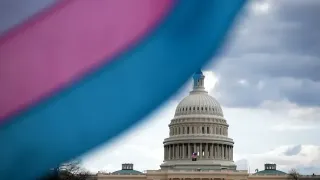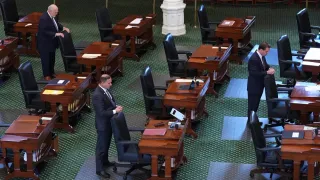
3 hours ago
Transgender Federal Employees Say They Face Fear and Discrimination Under Trump
Claire Savage READ TIME: 4 MIN.
Marc Seawright took pride in his job at the U.S. Equal Employment Opportunity Commission, where he worked for more than eight years and most recently oversaw technology policy to support the agency’s mission of combating workplace harassment and discrimination.
But then President Donald Trump began targeting transgender and nonbinary people within hours of returning to the White House by issuing a series of executive orders — including one declaring the existence of two unchangeable sexes. Seawright was ordered to develop technology to scrub any mention of LGBTQ+ identities from all EEOC outreach materials, which had been created to help employers understand their obligations under civil rights law.
Suddenly, his tech expertise "was being leveraged to perpetuate discrimination against people like me," said Seawright, 41, who served as the EEOC's director of information governance and strategy before he quit in June, citing a hostile work environment. "It became overwhelming. It felt insurmountable.”
A San Francisco-based Army veteran, Seawright is one of 10 transgender and gender nonconforming government employees across federal agencies who spoke with The Associated Press about their workplace experiences since Trump regained office, describing their fear, grief, frustration, and distress working for an employer that rejects their identity — often with no clear path for recourse or support. Several requested anonymity for fear of retaliation; some, including Seawright, have filed formal discrimination complaints.
Since January, the Trump administration has reversed years of legal and policy gains for transgender Americans, from stripping government websites of “gender ideology” to reinstituting a ban on transgender service members in the military.
The White House and the EEOC declined to respond to allegations that the president's policies created a hostile workplace for transgender federal employees. But his executive order, which defines sex as strictly male or female, states that its goal is to protect spaces designated for women and girls.
“Efforts to eradicate the biological reality of sex fundamentally attack women by depriving them of their dignity, safety, and well-being,” the order says.
Independent Women, a nonprofit that advocates for legislation defining sex as male and female, supports Trump's executive order.
“Women’s rights can get erased if men can just self-identify to women’s spaces,” said the organization's senior legal adviser Beth Parlato.
Brad Sears, senior scholar at UCLA School of Law’s Williams Institute, which researches policy impacting LGBTQ+ people, points to “a sweeping, government-wide initiative to really erase transgender people from public life,” including adults in the workplace.
“The federal workplace is increasingly an inhospitable place for the transgender employees who remain,” Sears said.
Compared to private sector workers, transgender federal employees are especially vulnerable because many ultimately answer to the president, said Olivia Hunt, director of federal policy at Advocates for Trans Equality, which seeks legal and political rights for transgender people in the United States.
“In the absence of an ability to impose their will directly on employers throughout the country, this administration is going to use the tools that they have to attack the trans people who are in close proximity to them, and that includes federal workers,” Hunt said.
After serving as the first openly transgender soldier in the Illinois National Guard, LeAnne Withrow retired from the military due to injury, and now works in a federal civilian role helping military families access resources.
Withrow visits armories across Illinois for her job, sometimes in remote areas. But Trump's executive order directing agencies to take “appropriate action” to ensure that intimate spaces "are designated by sex and not identity” created a major hurdle for Withrow when her supervisors informed her that she was no longer allowed to use the women’s restroom at work.
“I don’t use men’s spaces because I don’t feel comfortable doing that,” the 34-year-old said.
At locations without single-occupancy options, a simple bathroom break can mean a 45-minute round trip to a nearby gas station or McDonald’s.
Represented by the ACLU, Withrow filed a class action complaint in May challenging the Trump administration’s policy on the basis of sex discrimination.
A spokesperson for the Illinois National Guard declined to comment on the pending lawsuit but said the agency is “committed to treating all of our employees with dignity and respect.” The Department of Defense also declined to comment, citing policy, but affirmed its commitment to enforcing relevant laws and implementing the gender executive order.
For Seawright at the EEOC, he feels like his skill set was being wielded against the agency’s mission, not to support it. Following Trump's signing of his executive order, Acting EEOC Chair Andrea Lucas, a Republican, quickly began reshaping policy and, among other things, removed the agency’s “pronoun app,” which allowed employees to display their pronouns in their profiles. It was a tool that was created — then dismantled — by Seawright.
He had spent two years developing the app to support a nonbinary employee at the agency.
“For it to be just kind of yanked away summarily with none of the thoughtfulness and planning that went into implementing the tool ... that became really frustrating," Seawright said.
His mental health suffered, and he requested extended personal leave shortly after he completed the project scrubbing references to gender identity. When he returned in late February, the situation continued to deteriorate.
He hired lawyers at Katz Banks Kumin and filed a formal discrimination complaint. In June, Seawright resigned, citing “significant distress, anxiety, depression, sleeplessness, anger, and sadness” caused daily by Lucas’ "anti-transgender actions.”
Withrow, meanwhile, still works in her role while navigating similar challenges.
“I do feel as though there is at least an implied threat for trans folks in federal service," she said. "We’ll just continue to meet the objectives and focus on the mission, and hope that that is enough proof that we belong.”






